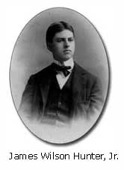James Wilson Hunter Jr.
Elmwood Cemetery
1st Alley East, Lot 17

James Wilson Hunter, Jr. was educated at the Alexandria Episcopal High School in Alexandria, Virginia before being accepted at the University of Virginia to study medicine. In 1901 he returned to Norfolk to practice both cardiology and radiology, having the distinction of being Norfolk’s first radiologists in 1910. He served as radiologist to St. Vincent’s Hospital. During the first World War, he served as a member of the Medical Advisory Board with the rank of Captain Medical Corps USA. During his thirty-eight year career he was involved with a number of medical societies including the Norfolk County Medical Society (President), Medical Society of Virginia, American College of Physicians, American College of Radiology, American Heart Association and the American Association for the Advancement of Science. Additionally, he was well published in a number of medical journals. In addition to his medical affiliations, Dr. Hunter belonged to the Huguenot Society of America, Association for the Preservation of Virginia Antiquities, and the Society of the Cincinnati.
Dr. Hunter retired in 1939. With his own health failing he passed away while at the Army and Navy General Hospital in Hot Springs, Arkansas on May 11, 1940.
Harriett and Eloise were both educated at the Phillips and West School on East Freemason Street in Norfolk. They both devoted much of their adult life to the activities of a variety of patriotic and genealogical societies including: Daughters of the American Revolution; United Daughters of the Confederacy; Ancient and Honorable Society, Barons of Runneymede; Daughters of American Colonies; Daughters of Colonial Wars; First Families of Virginia; Knights of the Bath; and the Plantagenet Society.
Harriett passed away on June 22, 1958 and Eloise survived her until her death on December 3, 1965. They, too, are buried on the Hunter family lot in Elmwood Cemetery.
Hunter House Victorian Museum
The Hunter House Victorian Museum was built in 1894 as the Hunter family home.
As none of the three children married, they continued to live their adult lives in their family home. With no heirs, Eloise as the last surviving member of the family, created the Hunter Foundation. According to her will, she required the foundation to operate her “residence at 240 Freemason Street … with the furniture, decorations, paintings and curios … as a museum and example of American Victorian Architecture.”
In 1988 the Hunter’s family home opened to the public as the Hunter House Victorian Museum. The interior was refurbished with reproduction wall coverings, floor and drapery treatments and upholstery on the original furnishings. Lighting fixtures were refurbished as well with the inclusion of reproduction fixtures where needed. The original collection of furnishings and decorative arts has been complemented with the donation of several unique pieces.
The museum provides guided tours for the public April through December each year as well as offering a full season of special tours, exhibits and events highlighting the various facets of Victorian social history and custom.
Special educational programming is also offered throughout the season for groups of all ages and interests from pre-school to elder hostel.
In 1990 the museum also became the headquarters for a local chapter of the national organization of the Victorian Society in America, the Eloise Hunter Chapter, Victorian Society in America, named for the museum’s founder, Eloise Dexter Hunter.*
Biographical information provided by Norfolk Bureau of Cemeteries.
Visitor Information
Visitor Hours: Sunrise to Sunset
Office hours: Monday to Friday 9:00 AM to 4:30 PM
Free parking inside cemetery.
Admission Cost: Free
Address: 238 E. Princess Anne Road , Norfolk, VA 23510
Official web site for more information: www.norfolk.gov/cemeteries
Norfolk Society for Cemetery Conservation Web Site: www.norfolksocietyforcemeteryconservation.org
